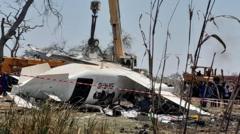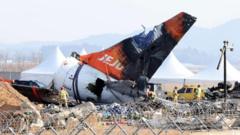South Korean aviation authorities are grappling with a significant challenge following the recent crash of Jeju Air Flight 7C 2216, which tragically claimed the lives of 179 individuals.
Jeju Air Crash: Investigators Stymied by Flight Recorder Malfunction

Jeju Air Crash: Investigators Stymied by Flight Recorder Malfunction
The inability to retrieve crucial data from the flight recorder complicates the investigation into South Korea's tragic plane crash.
The flight recorder of the Boeing 737-800 abruptly ceased operation just four minutes before the aircraft's crash at Muan International Airport, as confirmed by South Korean officials. This malfunction complicates inquiries into the catastrophic event that occurred on December 29, raising alarms about the lack of crucial data typically gathered from black boxes.
The last communication from the flight occurred when the pilot issued a distress signal, affirming "Mayday, mayday, mayday," and reported a "bird strike.” A critical decision was made to execute a go-around, indicating the pilot intended to retry landing. However, tragically, the aircraft failed to achieve this and landed on its belly, suffering a speed control issue that ultimately led it to overshoot the runway.
Investigators have called this missing data a major setback, as the recording would have provided insights vital for understanding the circumstances surrounding the crash. The South Korean Ministry of Land, Infrastructure, and Transport announced that investigations would focus on resolving the issue with the flight recorder while also exploring alternative data sources.
Flight 7C2216 was traveling from Bangkok with a total of 181 passengers on board when the accident occurred. In the aftermath, the crash resulted in a fiery explosion upon impact with a concrete structure positioned at the end of the runway, which magnifies the need for thorough analysis to ensure future air travel safety.
The last communication from the flight occurred when the pilot issued a distress signal, affirming "Mayday, mayday, mayday," and reported a "bird strike.” A critical decision was made to execute a go-around, indicating the pilot intended to retry landing. However, tragically, the aircraft failed to achieve this and landed on its belly, suffering a speed control issue that ultimately led it to overshoot the runway.
Investigators have called this missing data a major setback, as the recording would have provided insights vital for understanding the circumstances surrounding the crash. The South Korean Ministry of Land, Infrastructure, and Transport announced that investigations would focus on resolving the issue with the flight recorder while also exploring alternative data sources.
Flight 7C2216 was traveling from Bangkok with a total of 181 passengers on board when the accident occurred. In the aftermath, the crash resulted in a fiery explosion upon impact with a concrete structure positioned at the end of the runway, which magnifies the need for thorough analysis to ensure future air travel safety.





















